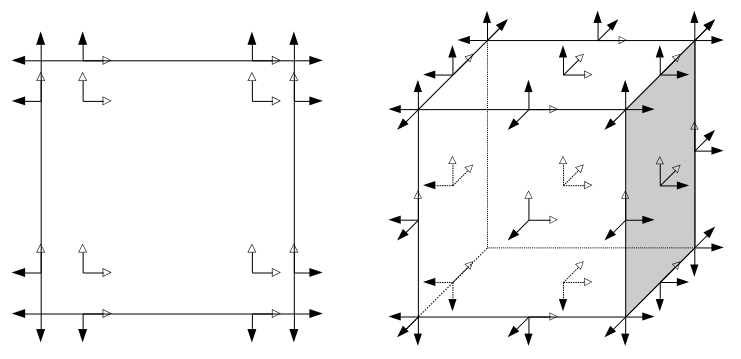 |
Reference documentation for deal.II version 9.3.3
|
 |
Reference documentation for deal.II version 9.3.3
|
#include <deal.II/base/polynomials_rt_bubbles.h>
Public Member Functions | |
| PolynomialsRT_Bubbles (const unsigned int k) | |
| void | evaluate (const Point< dim > &unit_point, std::vector< Tensor< 1, dim > > &values, std::vector< Tensor< 2, dim > > &grads, std::vector< Tensor< 3, dim > > &grad_grads, std::vector< Tensor< 4, dim > > &third_derivatives, std::vector< Tensor< 5, dim > > &fourth_derivatives) const override |
| std::string | name () const override |
| virtual std::unique_ptr< TensorPolynomialsBase< dim > > | clone () const override |
| unsigned int | n () const |
| unsigned int | degree () const |
Static Public Member Functions | |
| static unsigned int | n_polynomials (const unsigned int degree) |
Private Attributes | |
| const PolynomialsRaviartThomas< dim > | raviart_thomas_space |
| std::vector< Polynomials::Polynomial< double > > | monomials |
| const unsigned int | polynomial_degree |
| const unsigned int | n_pols |
This class implements the Hdiv-conforming, vector-valued enhanced Raviart-Thomas polynomials.
Similarly to the classical Raviart-Thomas space, the enhanced Raviart-Thomas polynomials are constructed such that the divergence is in the tensor product polynomial space Qk-1.
This space is of the form Vk = RTk-1 + Bk, where Bk is defined as follows:
\begin{align*} B_k^1(E) = \text{span}\left\{x^{a_1-1} y^{a_2}\begin{pmatrix} (a_2+1) x \\ -a_1 y \end{pmatrix}\text{ : } a_2=k \right\} \\ B_k^2(E) = \text{span}\left\{x^{b_1} y^{b_2-1}\begin{pmatrix} -b_2 x \\ (b_1+1) y \end{pmatrix}\text{ : } b_1=k \right\} \end{align*}
\begin{align*} B_k^1(E) = \text{span}\left\{x^{a_1-1} y^{a_2} z^{a_3}\begin{pmatrix} (a_2+a_3+2) x \\ -a_1 y \\ -a_1 z \end{pmatrix}\text{ : } a_2=k \text{ or } a_3=k \right\},\\ B_k^2(E) = \text{span}\left\{x^{b_1} y^{b_2-1} z^{b_3}\begin{pmatrix} -b_2 x \\ (b_1+b_3+2) y \\ -b_2 z \end{pmatrix}\text{ : } b_1=k \text{ or } b_3=k \right\},\\ B_k^3(E) = \text{span}\left\{x^{c_1}y^{c_2}z^{c_3-1}\begin{pmatrix} -c_3 x \\ -c_3y \\ (c_1+c_2+2)z \end{pmatrix}\text{ : } c_1=k \text{ or } c_2=k \right\}, \end{align*}
where \(0 \le a_1, a_2, a_3 \le k\).
The total dimension of the space dim(Vk) = d*(k+1)^d, where d is the space dimension. This allows to associate shape functions with the Gauss-Lobatto quadrature points as shown in the figures below.

|
| Left - \(2D,\,k=3\), right - \(3D,\,k=2\). |
Definition at line 86 of file polynomials_rt_bubbles.h.
| PolynomialsRT_Bubbles< dim >::PolynomialsRT_Bubbles | ( | const unsigned int | k | ) |
Constructor. Creates all basis functions for RT_bubbles polynomials of given degree.
Definition at line 30 of file polynomials_rt_bubbles.cc.
|
overridevirtual |
Computes the value and the first and second derivatives of each RT_bubbles polynomial at unit_point.
The size of the vectors must either be zero or equal n(). In the first case, the function will not compute these values.
If you need values or derivatives of all tensor product polynomials then use this function, rather than using any of the compute_value, compute_grad or compute_grad_grad functions, see below, in a loop over all tensor product polynomials.
Implements TensorPolynomialsBase< dim >.
Definition at line 45 of file polynomials_rt_bubbles.cc.
|
inlineoverridevirtual |
Return the name of the space, which is RT_Bubbles.
Implements TensorPolynomialsBase< dim >.
Definition at line 151 of file polynomials_rt_bubbles.h.
|
static |
Return the number of polynomials in the space RT_Bubbles(degree) without requiring to build an object of PolynomialsRT-Bubbles. This is required by the FiniteElement classes.
Definition at line 838 of file polynomials_rt_bubbles.cc.
|
overridevirtual |
A sort of virtual copy constructor, this function returns a copy of the polynomial space object. Derived classes need to override the function here in this base class and return an object of the same type as the derived class.
Some places in the library, for example the constructors of FE_PolyTensor, need to make copies of polynomial spaces without knowing their exact type. They do so through this function.
Implements TensorPolynomialsBase< dim >.
Definition at line 850 of file polynomials_rt_bubbles.cc.
|
inlineinherited |
Return the number of polynomials.
Definition at line 155 of file tensor_polynomials_base.h.
|
inlineinherited |
Return the highest polynomial degree of polynomials represented by this class. A derived class may override this if its value is different from my_degree.
Definition at line 164 of file tensor_polynomials_base.h.
|
private |
An object representing the Raviart-Thomas part of the space
Definition at line 139 of file polynomials_rt_bubbles.h.
|
private |
Storage for monomials, we need all polynomials from degree zero to k+1.
Definition at line 145 of file polynomials_rt_bubbles.h.
|
privateinherited |
The highest polynomial degree of this functions represented by this object.
Definition at line 143 of file tensor_polynomials_base.h.
|
privateinherited |
The number of polynomials represented by this object.
Definition at line 148 of file tensor_polynomials_base.h.